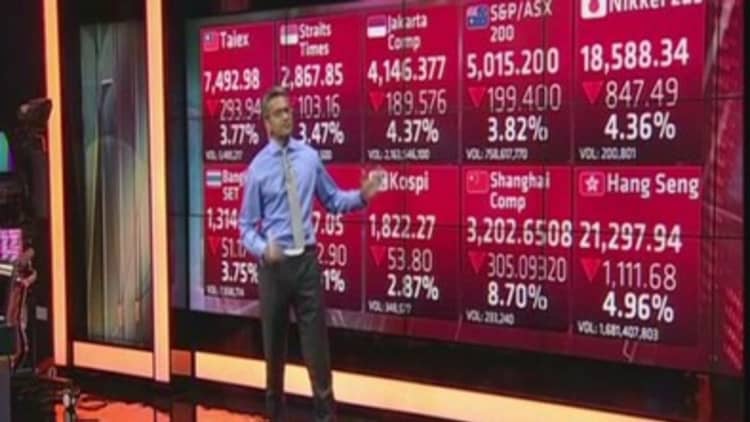
The selloff in global markets gathered force on Monday, with commodities and stocks hitting a number of records. Here's a list of the highs and lows seen in the markets on Monday.
Taiwan stocks plunged to their lowest level in nearly three years, with the main TAIEX index falling 4.8 percent to close at 7,410.34, its lowest since November 2012.
U.S. soybeans hit a fresh six-year low in Asian trade on Monday, according to Reuters, having fallen 2 percent on Friday as well.
Chicago Board of Trade November soybeans, the most actively traded contract, fell as low as $8.71-1/2. Front-month soybeans hit a session low of $8.88-2/8 a bushel, the lowest since October 2009.
"China is the world's biggest buyer of soy and the market is concerned about a slowdown," said Phin Ziebell, agribusiness economist at National Australia Bank. "The other part of it is the weather in the United States and there is quite a lot of optimism on the crop. It is combining to see today's price falls."
The Shanghai Composite erased its 2015 gains, including the 60 percent it added between January and June, after closing down 8.5 percent on Monday. This was the benchmark Chinese index's biggest one-day percentage fall since February 2007.
Hong Kong's Hang Seng index closed 5.2 percent lower at its lowest since March 2014.
Gold hovered near its highest level in almost seven weeks, before falling 0.4 percent to $1,155.56 an ounce in afternoon U.S. trade.
"Gold is rising on market fears," said Howie Lee, analyst at Phillip Futures in Singapore. Lee said gold looked on track to rally to $1,200 an ounce, a level last seen in June.
sunk to a four-year low of 1,200.31 against the dollar. The KOSPI ended the day down 2.5 percent to 1,829.81 points, its biggest percentage fall since June 2012.
Brent and U.S. crude oil futures hit fresh six-and-a-half-year year lows, dropping under the latest supports of $45 a barrel and $40 a barrel each, as investors fretted that a slowing Chinese economy would lead to weaker demand amid a global supply surplus.
"Supply-side news continues to dominate the market ... Fears of surging Iranian oil are likely to increase further after Iran's oil minister stated the country had plans to raise oil production at any cost," ANZ said in a note on Monday.
Australia's benchmark share index fell 4.1 percent on Monday to close at 5,001.3, the lowest level since July 2013. The S&P/ASX 200 is on track for its worst month since the 2008 global financial crisis, having lost 12.3 percent so far in August.
London copper futures dropped to their lowest levels since 2009. Three-month copper on the London Metal Exchange traded 3 percent lower on the day at one stage at $4,903 a ton, the lowest since July 2009.
The Indonesian stock index tumbled on Monday. The Jakarta Composite fell as much as 5 percent during the day to hit its lowest level since December 2013.
Thailand's index plunged around 4.7 percent and was trading at its lowest level since February 2014.
Germany's DAX index fell as much as 5 percent and traded below 10,000 points for the first time since January.
- Reuters contributed to this report.


